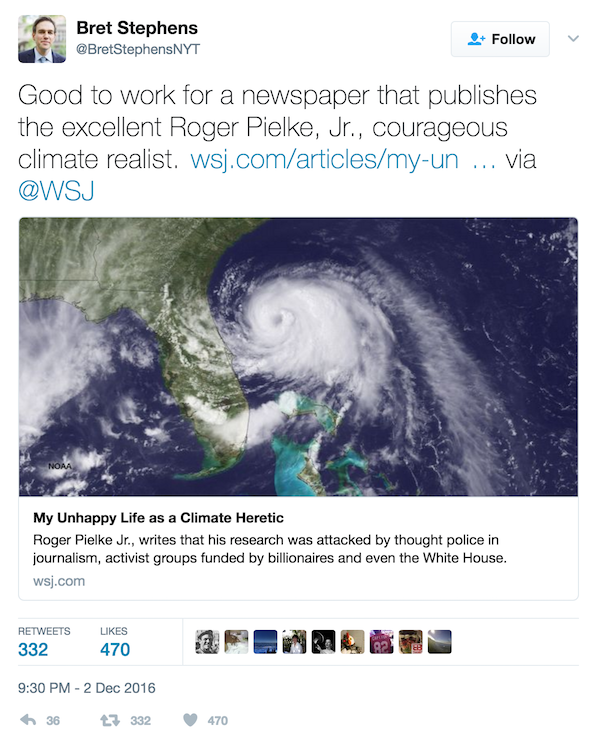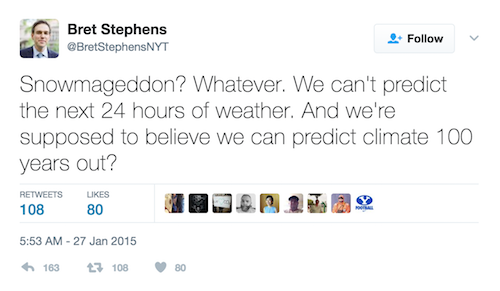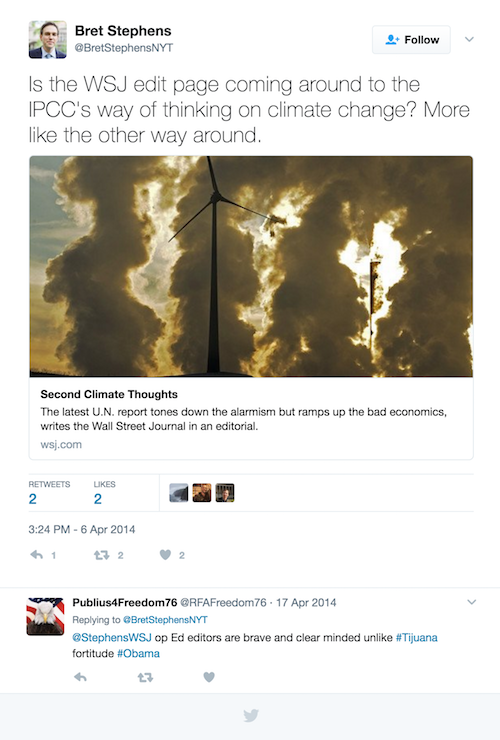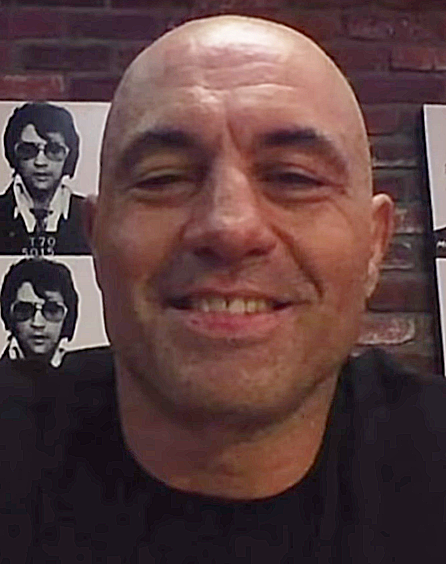Bret Stephens
Credentials
- M.Sc., London School of Economics
- B.A., University of Chicago
Background
Bret Stephens is a conservative opinion columnist at The New York Times.1Joe Rohm. “After hyping itself as antidote to fake news, New York Times hires extreme climate denier,” ThinkProgress, April 13, 2017. Archived April 16, 2017. Archive.is URL:https://archive.is/wdNi1
Stephens is the former writer of the “Global View” column on foreign affairs at The Wall Street Journal (WSJ), where he was also deputy editorial page editor and an editorial board member. He first joined the WSJ in 1998 as an op-ed editor, leaving the paper in 2002 to work as editor-in-chief of The Jerusalem Post, later returning to the Journal in late 2004.2“Bret Stephens,” The Wall Street Journal. Archived April 16, 2017. Archive.is URL: https://archive.is/fGJy7
Stephens’ April 2017 hiring by The New York Times generated controversy due to his views on climate change, which he had described as “mass hysteria” for which “much of the science has since been discredited.”3Joe Rohm. “After hyping itself as antidote to fake news, New York Times hires extreme climate denier,” ThinkProgress, April 13, 2017. Archived April 16, 2017. Archive.is URL:https://archive.is/wdNi1
However, by October 2022, his stance had shifted. Stephens announced in a column that he now advocated fast action on climate change, and that the best responses would be market-based and involve new technologies, rather than government regulations or lowering demand.4Bret Stephens. “Climate Change Is Real. Markets, Not Governments, Offer the Cure,” The New York Times, October 28, 2022. Archive.today URL: http://archive.today/OoBa0.
Stephens has been a regular panelist on the Fox News program “Journal Editorial Report.” In 2004, he was named a Young Global Leader by the World Economic Forum, where he is also a media fellow. In 2013, he won the Pulitzer Prize for commentary for his work at The Wall Street Journal.5“Bret Stephens,” The Wall Street Journal. Archived April 16, 2017. Archive.is URL: https://archive.is/fGJy7
Stance on Climate Change
October 28, 2022
In a New York Times column, Stephens wrote that after experiencing “how swiftly and implacably nature can overwhelm even the riches and most technologically advanced societies,” he realized that action is needed on climate change. He expressed support for market-based and technological solutions to climate mitigation and resilience, rather than government regulation or “deindustrialization,” and stated that “a continual drumbeat of alarm may do more to exhaust voters than it will to rouse them.”6Bret Stephens. “Climate Change Is Real. Markets, Not Governments, Offer the Cure,” The New York Times, October 28, 2022. Archive.today URL: http://archive.today/OoBa0.
“Devising effective climate policies begins with recognizing the reality of the social and political landscape in which all policy operates,” Stephens wrote. “Some thoughts on how we might do better:
“…[S]top viewing economic growth as a problem. Industrialization may be the leading cause of climate change. But we cannot and will not reverse it through some form of deindustrialization, which would send the world into poverty and deprivation. Instead, economic growth should be seen as an ally in the fight against climate change, because it creates both the wealth that can mitigate the effects of climate change and the technological innovation needed to address its causes. That’s especially true of poorer countries, for which foreign investment, free trade, market-oriented reforms and good regulatory frameworks will do more to build climate resilience than additional billions in foreign aid.
“Get serious about the environmental trade-offs that come with clean energy. You cannot support wind farms but hinder the transmission lines needed to bring their power to the markets where they are needed. You cannot support wind farms but sue to block them in places where they might block your view of Nantucket Sound. You cannot support wind farms but support environmental regulations that make mining for rare earths in the United States unprofitable and send the industry to China (where meaningful regulations are effectively nonexistent). And you cannot cheer U.S. reductions in greenhouse gas emissions but oppose the fracking revolution in natural gas that helped bring it about.”7Bret Stephens. “Climate Change Is Real. Markets, Not Governments, Offer the Cure,” The New York Times, October 28, 2022. Archive.today URL: http://archive.today/OoBa0.
April 2017
In a statement to the Huffington Post, Bret Stephens described himself as a “climate agnostic”:8“Hiring Anti-Trump Conservative Is Part Of New York Times’ Effort To Expand Opinion,” Huffington Post, April 14, 2017. Archived April 17, 2017. Archive.is URL: https://archive.is/FlZSv
“Is the earth warming?” he asked. “That’s what the weight of scientific evidence indicates. Is it at least partially, and probably largely, a result of man-made carbon emissions? Again, that seems to be the case. Am I ‘anti-science’? Hell, no.”
“I say ‘seems’ because the history of science is replete with consensus positions that have evolved ― or crumbled ― under the weight of additional scientific evidence,” he continued. “Our radically changing understanding of cancer and of the ways of curing it is a salient example of what I mean.”9“Hiring Anti-Trump Conservative Is Part Of New York Times’ Effort To Expand Opinion,” Huffington Post, April 14, 2017. Archived April 17, 2017. Archive.is URL: https://archive.is/FlZSv
November 2015
Writing for The Wall Street Journal, Bret Stephens characterized climate change as “hysteria” and listed it among other “imaginary enemies.” Other “imaginary enemies” included “hunger in America,” “the campus-rape epidemic,” and “institutionalized racism:”10Bret Stephens. “Liberalism’s Imaginary Enemies,” The Wall Street Journal, November 30, 2015. Archived April 16, 2017.
“The hysteria generated by an imperceptible temperature rise of 1.7 degrees Fahrenheit since 1880—as if the trend is bound to continue forever, or is not a product of natural variation, or cannot be mitigated except by drastic policy interventions. The hyping of flimsy studies—melting Himalayan glaciers; vanishing polar ice—to press the political point. The job security and air of self-importance this provides the tens of thousands of people—EPA bureaucrats, wind-turbine manufacturers, litigious climate scientists, NGO gnomes—whose livelihoods depend on a climate crisis. The belief that even if the crisis isn’t quite what it’s cracked up to be, it does us all good to be more mindful about the environment.”11Bret Stephens. “Liberalism’s Imaginary Enemies,” The Wall Street Journal, November 30, 2015. Archived April 16, 2017.
“Here’s a climate prediction for the year 2115: Liberals will still be organizing campaigns against yet another mooted social or environmental crisis. Temperatures will be about the same.”12Bret Stephens. “Liberalism’s Imaginary Enemies,” The Wall Street Journal, November 30, 2015. Archived April 16, 2017.
November 29, 2011
In a column for The Wall Street Journal titled “The Great Global Warming Fizzle,” Stephens compared mainstream climate science to religion:13Bret Stephens. “The Great Global Warming Fizzle,” The Wall Street Journal, November 29, 2011. Archived February 15, 2015. Archive.is URL: http://archive.is/ZVHKv
“Consider the case of global warming, another system of doomsaying prophecy and faith in things unseen.
As with religion, it is presided over by a caste of spectacularly unattractive people pretending to an obscure form of knowledge that promises to make the seas retreat and the winds abate. As with religion, it comes with an elaborate list of virtues, vices and indulgences. As with religion, its claims are often non-falsifiable, hence the convenience of the term “climate change” when thermometers don’t oblige the expected trend lines. As with religion, it is harsh toward skeptics, heretics and other “deniers.” And as with religion, it is susceptible to the earthly temptations of money, power, politics, arrogance and deceit.” 14Bret Stephens. “The Great Global Warming Fizzle,” The Wall Street Journal, November 29, 2011. Archived February 15, 2015. Archive.is URL: http://archive.is/ZVHKv
April 2010
Stephens declared that global warming was “dead” in his WSJ column:15“Bret Stephens. “What’s the Next ‘Global Warming’?“ Wall Street Journal, April 6, 2010. Archived April 17, 2017.
“So global warming is dead, nailed into its coffin one devastating disclosure, defection and re-evaluation at a time. Which means that pretty soon we’re going to need another apocalyptic scare to take its place,” he wrote.
He concluded with a proposal for “a readers’ contest to invent the next panic. It must involve something ubiquitous, invisible to the naked eye, and preferably mass-produced. And the solution must require taxes, regulation, and other changes to civilization as we know it.”16“Bret Stephens. “What’s the Next ‘Global Warming’?“ Wall Street Journal, April 6, 2010. Archived April 17, 2017.
Key Quotes
December 2016
Bret Stephens announced on Twitter that he was proud to work for a newspaper willing to publish the work of climate change denier Roger Pielke, Jr., linking to Pielke’s article titled “My Unhappy Life as a Climate Heretic”:17“Good to work for a newspaper that publishes the excellent Roger Pielke, Jr., courageous climate realist. […],” Twitter post by Bret Stephens, December 2, 2016.

August 2015
Bret Stephens wrote in his WSJ column that, after visiting Hiroshima, he believed that “Hiroshima and Nagasaki weren’t merely horrific, war-ending events. They were lifesaving.”18“Thank God for the Atom Bomb,” The Wall Street Journal, August 3, 2015. Archived April 17, 2017.
“The bomb turned the empire of the sun into a nation of peace activists,” Stephens wrote. “Modern Japan is a testament to the benefits of total defeat, to stripping a culture prone to violence of its martial pretenses. Modern Hiroshima is a testament to human resilience in the face of catastrophe. It is a testament, too, to an America that understood moral certainty and even a thirst for revenge were not obstacles to magnanimity. In some ways they are the precondition for it.”19“Thank God for the Atom Bomb,” The Wall Street Journal, August 3, 2015. Archived April 17, 2017.
January 2015
In a Twitter post, Stephens claimed that we cannot predict climate change:20“Snowmageddon? Whatever. We can’t predict the next 24 hours of weather. […]” Twitter post by Bret Stephens, January 27, 2015.

April 2014
Posting on Twitter, Bret Stephens links to a WSJ editorial that concludes that “The IPCC also turns out to have an agenda that’s less about climate change than income inequality and redistribution.”21“Second Climate Thoughts,” Wall Street Journal, April 7, 2014. Archived April 17, 2017. 22“Is the WSJ edit page coming around to the IPCC‘s way of thinking on climate change? …“ Twitter post by Bret Stephens, April 6, 2014.

August 9, 2011
Bret Stephens wrote for The Wall Street Journal about President Barack Obama:23Bret Stephens. “Is Obama Smart?” The Wall Street Journal, August 9, 2011. Archived April 16, 2017.
“I don’t buy it. I just think the president isn’t very bright.”24Bret Stephens. “Is Obama Smart?” The Wall Street Journal, August 9, 2011. Archived April 16, 2017.
He concluded:25Bret Stephens. “Is Obama Smart?” The Wall Street Journal, August 9, 2011. Archived April 16, 2017.
“The presidency of Barack Obama is a case study in stupid does.”26Bret Stephens. “Is Obama Smart?” The Wall Street Journal, August 9, 2011. Archived April 16, 2017.
December 8, 2009
Stephens compared “global warming true believers” to Stalinists, anti-Semites, and communists, reported Media Matters. Stephens had written in the Wall Street Journal:27“WSJ columnist Stephens compares “global warming true believers” to Stalinists, anti-Semites, and communists,” Media Matters, December 8, 2009. Archived April 16, 2017. Archive.is URL: https://archive.is/b91XG 28Bret Stephens. “The Totalities of Copenhagen,” The Wall Street Journal, December 8, 2009. Archived December 13, 2009. Archive.is URL: https://archive.is/gLSSr
“[T]he really interesting question is less about the facts than it is about the psychology. Last week, I suggested that funding flows had much to do with climate alarmism. But deeper things are at work as well.
“One of those things, I suspect, is what I would call the totalitarian impulse. This is not to say that global warming true believers are closet Stalinists. But their intellectual methods are instructively similar. Consider:
[…]
“Monocausalism: For the anti-Semite, the problems of the world can invariably be ascribed to the Jews; for the Communist, to the capitalists. And as the list above suggests, global warming has become the fill-in-the-blank explanation for whatever happens to be the problem.”29Bret Stephens. “The Totalities of Copenhagen,” The Wall Street Journal, December 8, 2009. Archived December 13, 2009. Archive.is URL: https://archive.is/gLSSr
July 2008
Writing for The Wall Street Journal, Stephens declared:30Kevin Grandia. “Wall Street Journal’s Bret Stephens’ Sick Souled Neurosis,” DeSmog, July 3 2008.
“Global warming is a sick-souled religion.”31Kevin Grandia. “Wall Street Journal’s Bret Stephens’ Sick Souled Neurosis,” DeSmog, July 3 2008.
Key Actions
October 28, 2022
The New York Times published Stephens’ photo essay detailing his trip to Greenland to survey the melting ice. In the article, titled “Yes, Greenland’s Ice is Melting, But…” Stephens repeated arguments by Steven Koonin and Roger Pieke Jr., who he calls “climate nonalarmists.”32Bret Stephens. “Yes, Greenland’s Ice is Melting, But…” The New York Times, October 28, 2022. Archived August 9, 2023. Archive URL: https://archive.ph/r5P7E
“Just as cancer treatments, when they work at all, can have terrible side effects, much the same can be said of climate treatments,” Stephens wrote. “The gap between an accurate diagnosis and effective treatment remains dismayingly wide. The problem has become clearer to me; the solution hasn’t.”
August 31, 2017
Stephens wrote an opinion piece for The New York Times titled “Hurricanes, Climate and the Capitalist Offset.” In the article, citing data from Roger Pielke Jr. (who Stephens describes as “yet another victim of the climate lobby’s hyperactive smear machine”), he wrote that “disaster losses as a percentage of the world’s G.D.P., at just 0.3 percent, have remained constant since 1990. That’s despite the dollar cost of disasters having nearly doubled over the same time — at just about the same rate as the growth in the global economy.”33Bret Stephens. “Hurricanes, Climate and the Capitalist Offset,” The New York Times, August 31, 2017. Archived October 20, 2017. Archive.is URL: https://archive.is/ow5iN
“Climate activists often claim that unchecked economic growth and the things that go with are principal causes of environmental destruction. In reality, growth is the great offset. It’s a big part of the reason why, despite our warming planet, mortality rates from storms have declined from .11 per 100,000 in the 1900s to .04 per 100,000 in the 2010s,” Stephens wrote. He concludes that “The best lesson the world can take from Texas is to follow the path of its extraordinary economic growth on the way to environmental resilience.”34Bret Stephens. “Hurricanes, Climate and the Capitalist Offset,” The New York Times, August 31, 2017. Archived October 20, 2017. Archive.is URL: https://archive.is/ow5iN
June 2017
As reported at Mic, Bret Stephens joined MSNBC and NBC as an on-air contributor. Nicolle Wallace announced the news on her Wednesday MSNBC program, saying “We’re so, so, so lucky and happy to have you.”35Kelly Sutton. “Conservative columnist Bret Stephens joins MSNBC,” Mic, June 28, 2017. Archive.is URL: https://archive.is/c4Qm3
At the time, the network had also recently hired conservative radio show host Hugh Hewitt, as well as Wallace herself, who was a former spokesperson for George W. Bush.36Kelly Sutton. “Conservative columnist Bret Stephens joins MSNBC,” Mic, June 28, 2017. Archive.is URL: https://archive.is/c4Qm3
May 4, 2017
In a New York Times column, “Climate of Unintended Consequences,” Stephens argued that because a policy supporting biofuels had been broadly damaging after being initially supported, this showed there was a lesson for other policies aimed at supporting action on climate change.37Bret Stephens. “Climate of Unintended Consequences,” The New York Times, May 4, 2017. Archived October 20, 2017. Archive.is URL: http://archive.is/PeQbW
The column suggested that environmental campaigners had almost uniformly supported policies to back the production of ethanol from biofuels, but that this support had in later years turned out to be misplaced. Several writers pointed out that, in fact, many environment groups had been critical of the corn-based ethanol policies from the beginning.38“Bret Stephens Continues Shoveling BS into NY Times Opinion Section,” DeSmog, May 4, 2017.
Stephens also criticized Germany, suggesting the country’s “Energiewende” policy to promote renewable energy use had failed, writing: “The country is producing record levels of energy from wind and solar power, but emissions are almost exactly what they were in 2009.”39“Germany’s greenhouse gas emissions and climate targets,” Clean Energy Wire, February 1, 2017. Archived October 20, 2017. Archive.is URL: http://archive.is/ezrwW
German climate scientist Stefan Rahmstorf accused Stephens of cherry-picking the year 2009, when emissions were especially low, in order to disguise the steady reduction of Germany’s emissions over decades.40“Just asking @nytimes: why would @BretStephensNYT compare latest German greenhouse gas emissions with 2009, of all years? Delicious cherries!” Twitter post by user @rahmstorf, May 4, 2017. Archived .png on file at DeSmog.
Around the time that The New York Times published this column, an online petition against his hiring there topped 30,000.41Genevieve Guenther. “Tell The NY Times: do not promote climate denial at your paper,” change.org. Archived October 20, 2017. Archive.is URL: http://archive.is/lzlxr
May 1, 2017
Bret Stephens answered questions from readers about his first column for The New York Times, but largely ignored the issues raised by scientists. Then-public editor Liz Spayd also wrote about the response to Stephens’ first column, stating that she was worried Stephens was “minimizing the serious risk of climate change by referring to the ‘modest’ warming of the earth and likening polling data to sophisticated climate models.” She stated that she took him on his word that “he has no intention of manufacturing facts.”
April 28, 2017
The New York Times published Bret Stephens’ first column for the paper since his hire in early April. The column detailed what he claimed were unacceptable levels of claimed certainty around climate science. Stephens’ column prompted a wave of responses in other media outlets. Then-public editor Liz Spayd wrote there had been “thousands” of complaints about the column, including public criticisms from reporters at the newspaper.
At The Guardian, blogger Dana Nuccitelli said the column was “textbook hippie-punching.” In a long rebuttal, David Roberts at Vox said it was clear The Times had hired a “climate change bullshitter.” On ClimateFeedback, a site where scientists check media stories on climate change, Dr. Stefan Rahmstorf said the column was “vague, general and full of innuendo, and not supported by any evidence or specific examples. This style of discourse is characteristic for people that do not have the evidence on their side.”
Speaking to ThinkProgress, climate scientist Michael Mann said the column “confirms my worst fear: That the NY Times management is now willingly abetting climate change denialism.”
Prof. Robert Brulle said Stephens’ column was “climate misinformation.”
April 26, 2017
In an interview with Vox, Stephens said that a friend who was a climate activist had recently had a baby. Stephens told Vox: “If he thinks in 20 years we’ll be heading toward unsustainable climates and there will be tens of millions of people being displaced, presumably including himself, at the most apocalyptic level, then presumably he wouldn’t be having children. It contradicts the belief that we are heading ineluctably for an apocalyptic environmental future.”
Joe Romm of ThinkProgress said Stephens’ logic was “absurd”.
April 22, 2017
Then-New York Times public editor Liz Spayd published an explanation for the paper’s hiring of Bret Stephens. The column sparked a backlash among climate scientists. Some called her defense “offensive” and cancelled their subscriptions. Times editorial page editor James Bennet said he had “no doubt” that Stephens “crosses our bar for intellectual honesty and fairness.”
Stefan Rahmstorf, a professor at the Potsdam Institute for Climate Impacts Research, wrote a letter to the newspaper’s editors, saying: “The Times has denounced the critics of its decision as ‘left-leaning’. This is an insult to me and was the final straw to cancel my subscription. There is no left-leaning or right-leaning climate science, just as there is no republican or democrat theory of gravity.”
April 12, 2017
Bret Stephens joined the New York Times as an op-ed columnist. The Times‘ press release described Stephens as “a beautiful writer who ranges across politics, international affairs, culture and business.”42“Bret Stephens Joins NYT Opinion,” The New York Times Company, April 12, 2017. Archived April 16, 2017. Archive.is URL: https://archive.is/e03ov
Speaking with ThinkProgress via email, Robert J. Brulle, a media expert at Drexel University whom The New York Times once described as an “an expert on environmental communications,” said the hiring was “a very sad comment on The New York Times’ judgment.” Brulle said Stephens’s hiring “contradicts their claim” in a new ad campaign that truth is “now more important than ever,” and that the paper should “rescind his hiring.”43Joe Rohm. “After hyping itself as antidote to fake news, New York Times hires extreme climate denier,” ThinkProgress, April 13, 2017. Archived April 16, 2017. Archive.is URL:https://archive.is/wdNi1
In a 2014 op-ed column for The New York Times, climatologist Michael Mann had written that “a fringe minority of our populace clings to an irrational rejection of well-established science [which also] infects the halls of Congress, the pages of leading newspapers and what we see on TV.”44Joe Rohm. “After hyping itself as antidote to fake news, New York Times hires extreme climate denier,” ThinkProgress, April 13, 2017. Archived April 16, 2017. Archive.is URL:https://archive.is/wdNi1
Commenting to ThinkProgress on the hiring of Stephens, climatologist Michael Mann said, “Sadly, The New York Times itself seems to have fallen victim to this malady, hiring one of the most notorious climate change deniers, Bret Stephens, to promote climate denial propaganda on the once-hallowed pages of the Grey Lady.”45Joe Rohm. “After hyping itself as antidote to fake news, New York Times hires extreme climate denier,” ThinkProgress, April 13, 2017. Archived April 16, 2017. Archive.is URL:https://archive.is/wdNi1
July 2008
In a Wall Street Journal column titled “Global Warming as Mass Neurosis,” Stephens wrote that “global warming is a sick-souled religion.” The column began: “Last week marked the 20th anniversary of the mass hysteria phenomenon known as global warming. Much of the science has since been discredited.”46Bret Stephens. “Global Warming as Mass Neurosis,”Wall Street Journal, July 1, 2008. Archived April 16, 2017.
Regarding the effects of climate change on polar ice, Stephens adds:47Bret Stephens. “Global Warming as Mass Neurosis,”Wall Street Journal, July 1, 2008. Archived April 16, 2017.
“The Arctic ice cap may be thinning, but the extent of Antarctic sea ice has been expanding for years.”48Bret Stephens. “Global Warming as Mass Neurosis,”Wall Street Journal, July 1, 2008. Archived April 16, 2017.
As DeSmog noted, “Yes the Arctic ice cap is thinning and the old, thick ice that can withstand significant thawing under summer temperatures is being replaced by thin, seasonal ice that melts away much quicker in the spring. And this is something that has scientists very concerned, because as the old ice continues to be replaced by seasonal thin ice, the extent of the summer polar ice cap melting is increasing year-after-year.”49Kevin Grandia. “Wall Street Journal’s Bret Stephens’ Sick Souled Neurosis,” DeSmog, July 3 2008.
Moving on to ocean temperatures, Stephens wrote:50Bret Stephens. “Global Warming as Mass Neurosis,”Wall Street Journal, July 1, 2008. Archived April 16, 2017.
“Data from 3,000 scientific robots in the world’s oceans show there has been slight cooling in the past five years, never mind that ‘80% to 90% of global warming involves heating up ocean waters,’ according to a report by NPR‘s Richard Harris.”51Bret Stephens. “Global Warming as Mass Neurosis,”Wall Street Journal, July 1, 2008. Archived April 16, 2017.
DeSmog noted that while Stephens’s statement was correct based on the initial finding of NASA, an update shortly thereafter read as follows:
“Update as of 5/30/07: Recent analyses have revealed that results from some of the ocean float and shipboard sensor data used in this study were incorrect. As a result, the study’s conclusion that the oceans cooled between 2003 and 2005 can not be substantiated at this time. The study authors are currently working to correct these data errors and recompute ocean temperature changes.” (Emphasis NASA‘s).52Kevin Grandia. “Wall Street Journal’s Bret Stephens’ Sick Souled Neurosis,” DeSmog, July 3 2008.
Affiliations
- MSNBC/NBC — On-air contributor.53Kelly Sutton. “Conservative columnist Bret Stephens joins MSNBC,” Mic, June 28, 2017. Archive.is URL: https://archive.is/c4Qm3
- The New York Times — Op-ed columnist.54“Bret Stephens Joins NYT Opinion,” The New York Times Company, April 12, 2017. Archived April 16, 2017. Archive.is URL: https://archive.is/e03ov
- The Wall Street Journal — Former columnist and deputy editor of the opinion page.55“Bret Stephens,” The Wall Street Journal. Archived April 16, 2017. Archive.is URL: https://archive.is/fGJy7
- Fox News — Contributor and regular panelist on the Journal Editorial report (for example here, here, here, here, here, here, here, here, and here).56“Bret Stephens,” Fox News. Archived April 17, 2017. Archive.is URL: https://archive.is/6VtpU
- Jerusalem Post — Editor in chief 2002 – 2004.57“The Jerusalem Post Editors,” The Jerusalem Post. Archived April 17, 2017. Archive.is URL: https://archive.is/36dsb
- Commentary magazine — Contributor.58“AUTHOR ARCHIVE: Bret Stephens,” Commentary. Archived April 17, 2017. Archive.is URL: https://archive.is/X8Ysn
- PragerU — Made several videos on “foreign affairs.”59“COURSES,” PragerU. Archived .mp4s on file at DeSmog.
Social Media
- @BretStephensNYT on Twitter
- Bret Stephens on LinkedIn.
Publications
Some sample publications on climate change below. View the attached spreadsheet for a larger list of Bret Stephens’s publications and analysis (.xlsx).
The Wall Street Journal
- “Climate Profits and Profiteers,“ The Wall Street Journal, February 17, 2014
- “Does Environmentalism Cause Amnesia?“ The Wall Street Journal, November 3, 2013
- “Can Environmentalists Think?”The Wall Street Journal July 8, 2013
- “The Great Global Warming Fizzle,” The Wall Street Journal, November 29, 2011
- “What’s the Next ‘Global Warming’?“ The Wall Street Journal, April 6, 2010
- “The Totalities of Copenhagen,” The Wall Street Journal, December 8, 2009
- “Climategate: Follow the Money,” The Wall Street Journal, December 1, 2009
- “Freaked Out Over SuperFreakonomics,” The Wall Street Journal, October 6, 2009
- “Global Warming as Mass Neurosis,”The Wall Street Journal July 1, 2008
Books
Other Resources
- “Bret Stephens” on Wikipedia
- ”Bret Stephens’s greatest hits,” Mondoweiss, April 13, 2017. Archive.is URL: https://archive.is/ezh7V
- Zaid Jilani. “New York Times Promises Truth and Diversity, Then Hires Climate-Denying Anti-Arab White Guy,” The Intercept, April 14, 2017. Archive.is URL: https://archive.is/dfZZZ
- “Stephens, Bret,” Right Web, August 11, 2015. Archive.is URL: https://archive.is/3VYbs
Resources
- 1Joe Rohm. “After hyping itself as antidote to fake news, New York Times hires extreme climate denier,” ThinkProgress, April 13, 2017. Archived April 16, 2017. Archive.is URL:https://archive.is/wdNi1
- 2“Bret Stephens,” The Wall Street Journal. Archived April 16, 2017. Archive.is URL: https://archive.is/fGJy7
- 3Joe Rohm. “After hyping itself as antidote to fake news, New York Times hires extreme climate denier,” ThinkProgress, April 13, 2017. Archived April 16, 2017. Archive.is URL:https://archive.is/wdNi1
- 4Bret Stephens. “Climate Change Is Real. Markets, Not Governments, Offer the Cure,” The New York Times, October 28, 2022. Archive.today URL: http://archive.today/OoBa0.
- 5“Bret Stephens,” The Wall Street Journal. Archived April 16, 2017. Archive.is URL: https://archive.is/fGJy7
- 6Bret Stephens. “Climate Change Is Real. Markets, Not Governments, Offer the Cure,” The New York Times, October 28, 2022. Archive.today URL: http://archive.today/OoBa0.
- 7Bret Stephens. “Climate Change Is Real. Markets, Not Governments, Offer the Cure,” The New York Times, October 28, 2022. Archive.today URL: http://archive.today/OoBa0.
- 8“Hiring Anti-Trump Conservative Is Part Of New York Times’ Effort To Expand Opinion,” Huffington Post, April 14, 2017. Archived April 17, 2017. Archive.is URL: https://archive.is/FlZSv
- 9“Hiring Anti-Trump Conservative Is Part Of New York Times’ Effort To Expand Opinion,” Huffington Post, April 14, 2017. Archived April 17, 2017. Archive.is URL: https://archive.is/FlZSv
- 10Bret Stephens. “Liberalism’s Imaginary Enemies,” The Wall Street Journal, November 30, 2015. Archived April 16, 2017.
- 11Bret Stephens. “Liberalism’s Imaginary Enemies,” The Wall Street Journal, November 30, 2015. Archived April 16, 2017.
- 12Bret Stephens. “Liberalism’s Imaginary Enemies,” The Wall Street Journal, November 30, 2015. Archived April 16, 2017.
- 13Bret Stephens. “The Great Global Warming Fizzle,” The Wall Street Journal, November 29, 2011. Archived February 15, 2015. Archive.is URL: http://archive.is/ZVHKv
- 14Bret Stephens. “The Great Global Warming Fizzle,” The Wall Street Journal, November 29, 2011. Archived February 15, 2015. Archive.is URL: http://archive.is/ZVHKv
- 15“Bret Stephens. “What’s the Next ‘Global Warming’?“ Wall Street Journal, April 6, 2010. Archived April 17, 2017.
- 16“Bret Stephens. “What’s the Next ‘Global Warming’?“ Wall Street Journal, April 6, 2010. Archived April 17, 2017.
- 17“Good to work for a newspaper that publishes the excellent Roger Pielke, Jr., courageous climate realist. […],” Twitter post by Bret Stephens, December 2, 2016.
- 18“Thank God for the Atom Bomb,” The Wall Street Journal, August 3, 2015. Archived April 17, 2017.
- 19“Thank God for the Atom Bomb,” The Wall Street Journal, August 3, 2015. Archived April 17, 2017.
- 20“Snowmageddon? Whatever. We can’t predict the next 24 hours of weather. […]” Twitter post by Bret Stephens, January 27, 2015.
- 21“Second Climate Thoughts,” Wall Street Journal, April 7, 2014. Archived April 17, 2017.
- 22“Is the WSJ edit page coming around to the IPCC‘s way of thinking on climate change? …“ Twitter post by Bret Stephens, April 6, 2014.
- 23Bret Stephens. “Is Obama Smart?” The Wall Street Journal, August 9, 2011. Archived April 16, 2017.
- 24Bret Stephens. “Is Obama Smart?” The Wall Street Journal, August 9, 2011. Archived April 16, 2017.
- 25Bret Stephens. “Is Obama Smart?” The Wall Street Journal, August 9, 2011. Archived April 16, 2017.
- 26Bret Stephens. “Is Obama Smart?” The Wall Street Journal, August 9, 2011. Archived April 16, 2017.
- 27“WSJ columnist Stephens compares “global warming true believers” to Stalinists, anti-Semites, and communists,” Media Matters, December 8, 2009. Archived April 16, 2017. Archive.is URL: https://archive.is/b91XG
- 28Bret Stephens. “The Totalities of Copenhagen,” The Wall Street Journal, December 8, 2009. Archived December 13, 2009. Archive.is URL: https://archive.is/gLSSr
- 29Bret Stephens. “The Totalities of Copenhagen,” The Wall Street Journal, December 8, 2009. Archived December 13, 2009. Archive.is URL: https://archive.is/gLSSr
- 30Kevin Grandia. “Wall Street Journal’s Bret Stephens’ Sick Souled Neurosis,” DeSmog, July 3 2008.
- 31Kevin Grandia. “Wall Street Journal’s Bret Stephens’ Sick Souled Neurosis,” DeSmog, July 3 2008.
- 32Bret Stephens. “Yes, Greenland’s Ice is Melting, But…” The New York Times, October 28, 2022. Archived August 9, 2023. Archive URL: https://archive.ph/r5P7E
- 33Bret Stephens. “Hurricanes, Climate and the Capitalist Offset,” The New York Times, August 31, 2017. Archived October 20, 2017. Archive.is URL: https://archive.is/ow5iN
- 34Bret Stephens. “Hurricanes, Climate and the Capitalist Offset,” The New York Times, August 31, 2017. Archived October 20, 2017. Archive.is URL: https://archive.is/ow5iN
- 35Kelly Sutton. “Conservative columnist Bret Stephens joins MSNBC,” Mic, June 28, 2017. Archive.is URL: https://archive.is/c4Qm3
- 36Kelly Sutton. “Conservative columnist Bret Stephens joins MSNBC,” Mic, June 28, 2017. Archive.is URL: https://archive.is/c4Qm3
- 37Bret Stephens. “Climate of Unintended Consequences,” The New York Times, May 4, 2017. Archived October 20, 2017. Archive.is URL: http://archive.is/PeQbW
- 38“Bret Stephens Continues Shoveling BS into NY Times Opinion Section,” DeSmog, May 4, 2017.
- 39“Germany’s greenhouse gas emissions and climate targets,” Clean Energy Wire, February 1, 2017. Archived October 20, 2017. Archive.is URL: http://archive.is/ezrwW
- 40“Just asking
@nytimes: why would@BretStephensNYT compare latest German greenhouse gas emissions with 2009, of all years? Delicious cherries!” Twitter post by user @rahmstorf, May 4, 2017. Archived .png on file at DeSmog. - 41Genevieve Guenther. “Tell The NY Times: do not promote climate denial at your paper,” change.org. Archived October 20, 2017. Archive.is URL: http://archive.is/lzlxr
- 42“Bret Stephens Joins NYT Opinion,” The New York Times Company, April 12, 2017. Archived April 16, 2017. Archive.is URL: https://archive.is/e03ov
- 43Joe Rohm. “After hyping itself as antidote to fake news, New York Times hires extreme climate denier,” ThinkProgress, April 13, 2017. Archived April 16, 2017. Archive.is URL:https://archive.is/wdNi1
- 44Joe Rohm. “After hyping itself as antidote to fake news, New York Times hires extreme climate denier,” ThinkProgress, April 13, 2017. Archived April 16, 2017. Archive.is URL:https://archive.is/wdNi1
- 45Joe Rohm. “After hyping itself as antidote to fake news, New York Times hires extreme climate denier,” ThinkProgress, April 13, 2017. Archived April 16, 2017. Archive.is URL:https://archive.is/wdNi1
- 46Bret Stephens. “Global Warming as Mass Neurosis,”Wall Street Journal, July 1, 2008. Archived April 16, 2017.
- 47Bret Stephens. “Global Warming as Mass Neurosis,”Wall Street Journal, July 1, 2008. Archived April 16, 2017.
- 48Bret Stephens. “Global Warming as Mass Neurosis,”Wall Street Journal, July 1, 2008. Archived April 16, 2017.
- 49Kevin Grandia. “Wall Street Journal’s Bret Stephens’ Sick Souled Neurosis,” DeSmog, July 3 2008.
- 50Bret Stephens. “Global Warming as Mass Neurosis,”Wall Street Journal, July 1, 2008. Archived April 16, 2017.
- 51Bret Stephens. “Global Warming as Mass Neurosis,”Wall Street Journal, July 1, 2008. Archived April 16, 2017.
- 52Kevin Grandia. “Wall Street Journal’s Bret Stephens’ Sick Souled Neurosis,” DeSmog, July 3 2008.
- 53Kelly Sutton. “Conservative columnist Bret Stephens joins MSNBC,” Mic, June 28, 2017. Archive.is URL: https://archive.is/c4Qm3
- 54“Bret Stephens Joins NYT Opinion,” The New York Times Company, April 12, 2017. Archived April 16, 2017. Archive.is URL: https://archive.is/e03ov
- 55“Bret Stephens,” The Wall Street Journal. Archived April 16, 2017. Archive.is URL: https://archive.is/fGJy7
- 56
- 57“The Jerusalem Post Editors,” The Jerusalem Post. Archived April 17, 2017. Archive.is URL: https://archive.is/36dsb
- 58“AUTHOR ARCHIVE: Bret Stephens,” Commentary. Archived April 17, 2017. Archive.is URL: https://archive.is/X8Ysn
- 59“COURSES,” PragerU. Archived .mp4s on file at DeSmog.






